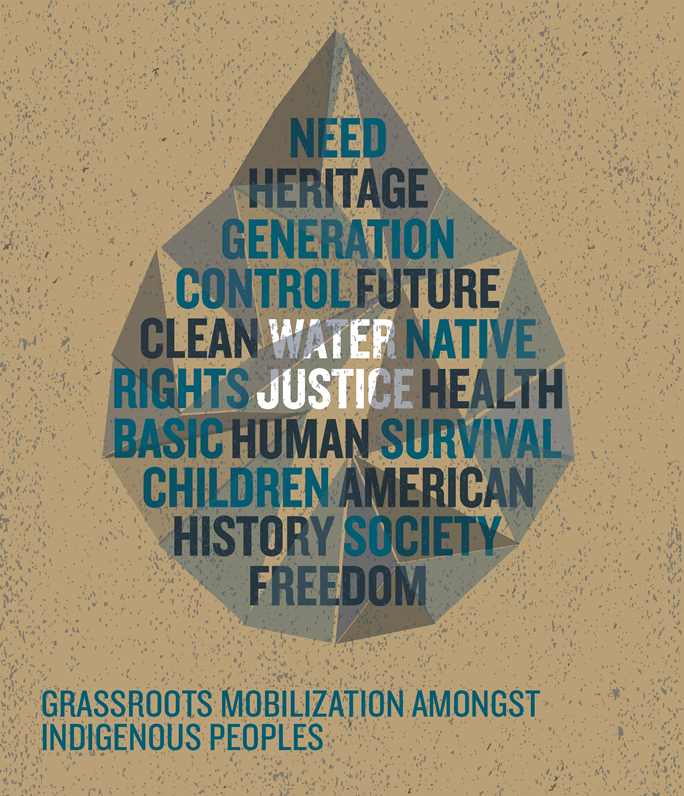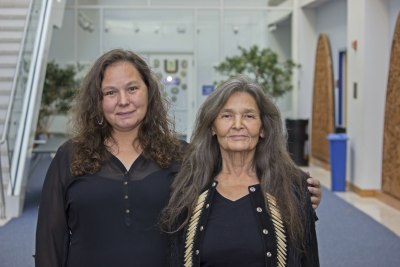 WEDNESDAY, OCTOBER 21, 2015
WEDNESDAY, OCTOBER 21, 2015
2:00 - 3:30pm | STAMFORD CAMPUS
MULTIPURPOSE ROOM 108
RECEPTION TO FOLLOW THE LECTURE
Speaker:Candace Ducheneaux, Hohwoju Lakota elder from the Cheyenne River Reservation, South Dakota
Candace Ducheneaux is a Hohwoju Lakota elder from the Cheyenne River Reservation in South Dakota. She is a frontline veteran of many grassroots battles for social and environmental justice for the Lakota Nation and stands against the destructive human forces that have destabilized earth’s ecological system and threaten the existence of all humanity. As a mother, grandmother and recent great grandmother of twins, Ducheneaux is very concerned with the water needs of present and future generations. She works to insure that the people of her tribe – as well as all Red Nations – will have safe water in a world in which clean water is becoming increasingly scarce and a commodity beyond the means of many.
In 2012, Ducheneaux founded Mni, Grassroots for Water Justice, an indigenous led movement based on the reservation and dedicated to preserving the environmental integrity of our sacred mother earth through Lakota understandings of respect and of reciprocity. Mni, Lakota for water, works to restore the planet to balance by healing the world water cycle, reversing climate change and returning sustainability to the lands. Mni will unite the indigenous nations of the western hemisphere in water and ecosystem restoration to impact the water cycle and lead the rest of the world to water sustainability, thus bringing together global struggles for environmental sustainability, indigenous rights, and the undeniable human right to water.
EVENT AFTERTHOUGHTS
By Catherine Buerger, Doctoral Candidate, Anthropology, University of Connecticut
 On Wednesday, October 21, the University of Connecticut’s Stamford Campus held its fall lecture as a part of the Senator Joseph I. Lieberman Lecture Series on Human Rights Practice. This semester’s lecture was given by Candace Ducheneaux, tribal liaison and program coordinator for the Mni Water Restoration Collaborative in the Cheyenne River Sioux tribal territory in central South Dakota. Through her work with the Mni Water Restoration Collaborative, Ducheneaux has worked on the frontlines of efforts to restore access to clean water within the Cheyenne River Sioux tribal territory, bringing together struggles for environmental sustainability, cultural rights, and the right to water. During the lecture, Ducheneaux began by describing the importance of water for the Lakota people. “It is our first home. It is our first taste and our first medicine … Water is life,” she stated.
On Wednesday, October 21, the University of Connecticut’s Stamford Campus held its fall lecture as a part of the Senator Joseph I. Lieberman Lecture Series on Human Rights Practice. This semester’s lecture was given by Candace Ducheneaux, tribal liaison and program coordinator for the Mni Water Restoration Collaborative in the Cheyenne River Sioux tribal territory in central South Dakota. Through her work with the Mni Water Restoration Collaborative, Ducheneaux has worked on the frontlines of efforts to restore access to clean water within the Cheyenne River Sioux tribal territory, bringing together struggles for environmental sustainability, cultural rights, and the right to water. During the lecture, Ducheneaux began by describing the importance of water for the Lakota people. “It is our first home. It is our first taste and our first medicine … Water is life,” she stated.
According to the Human Rights Council’s Special Rapporteur on the Human Right to Safe Drinking Water and Sanitation, nearly a billion people around the world do not have access to improved water sources with many more lacking access to safe water. Indigenous people often suffer disproportionately. Although not explicitly mentioned in the UN Covenant on Economic, Social and Cultural Rights, the right to water entered into international law through the UN Committee on Economic, Social and Cultural Rights General Comment 15 in November 2002. This comment acknowledges that access to clean water is a “prerequisite for the realization of other human rights” including the rights to education, housing, health, life, work, and protection against discrimination.
Throughout her talk, Ducheneaux spoke of the Oahe Dam construction and the subsequent destruction of land and local water systems. The Oahe Dam, located on the Missouri River near Pierre South Dakota, was constructed between the years of 1948-1959. By the time it reached its final height, the dam had caused major flooding of the surrounding areas. Seven Native American reservations lost land as a result of the flooding including the Cheyenne River Sioux tribal territory. As Ducheneaux noted, the dam not only caused displacement, but it also altered the local hydrologic systems.
Ducheneaux stated that the goal of the Mni Water Restoration Collaborative is to “reestablish the small water cycle by catching and using water where it falls.” Through this method, the organization hopes to begin to heal the worldwide water cycle. Ducheneaux also noted the importance of thinking about environmental sustainability and rights with a long-term perspective. “We believe that we don’t inherit the Earth from our ancestors, but borrow it from future generations,” she said, noting that the Lakota try to think seven generations ahead in terms of sustainability.
During the question and answer period, Ducheneaux and her daughter, Karen concluded by challenging the audience to change their thinking about water. They noted that we must consider the realities of water shortages and the destruction of water resources on a worldwide scale because of the interconnectedness of the global water system. “We need to switch our thinking about water away from something that will always be there,” stated Karen Ducheneaux.